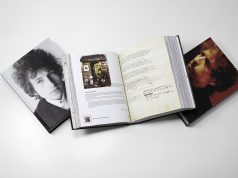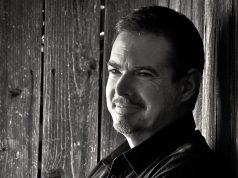
To write music criticism takes a certain level of self-assurance. That’s pretty obvious: You have to think pretty highly of your own opinion to be motivated to tell others why they should feel that way, too.
But it also takes a certain emotional investment to really convince yourself that something is good — and perhaps even more energy to actively think something is bad.
At some point, Chuck Klosterman lost the reserves of feelings he used to invest in disliking a band. He once relished the arguments over why the Red Hot Chili Peppers suck, or which mid-period Beach Boys album is the best. But now, he says he just doesn’t care like he used to, something he realized 10 years ago when he slid into his CD player a promo copy of The Very Best of the Eagles, a band he had once loathed. He writes about this change in his latest book, I Wear The Black Hat:
The first track was “Take It Easy.” It sounded OK, but — then again — it had always sounded OK. I’d accidentally heard this song hundreds of times in my life, so there wasn’t going to be any big surprise. It was the same song it had always been, remastered but unchanged. The only thing that was different was how I felt about the band itself: Suddenly, I felt nothing. I didn’t hate them. I didn’t love them, but I certainly didn’t view their subsistence as problematic or false or socially sinister. They were just an old rock band who made music that was significant and relaxing and inevitable, and who seemed to be hated (particularly by people like myself) for reasons that were both valid and ridiculous. So I listened to “Take It Easy” and I thought about its lyrical content, and I came to a mostly positive — but highly uncomfortable — realization about who I was and how I thought about art.
I no longer possessed the capacity to hate rock bands.
As a result, he started writing more about a broader range of topics. He began contributing sportswriting to ESPN, and since his epiphany he’s written two novels. Klosterman, 41, is now an essayist and pop culture critic in addition to a music writer. He writes The Ethicist column for The New York Times Magazine, and he’s a contributing editor at Grantland. I Wear The Black Hat explores villainy in popular culture, and why popular opinion turns against certain people and characters, regardless of how bad they actually are. He starts with a premise — “The villain is the person who knows the most but cares the least” — and goes on, in vintage Klosterman form, to spin a web of seemingly unconnected pop culture moments and historical events into surprisingly compelling arguments. His essay about those who craft an image of villainy — in this case, N.W.A. in the late-’80s — wanders into the Oakland Raiders and their owner, Al Davis, and director Lars Von Trier. He writes about how Bill Clinton escaped his sex scandal unscathed by discussing the Sharon Stone movie Basic Instinct, Ted Bundy and Wilt Chamberlain.
If you think that sounds a bit meandering, it is. And yet — Klosterman’s style has always been casually intellectual and easily digestible. Reading Klosterman always takes less time than it should, given the headiness of some of his subject matter. This is by design, perhaps a product of his early years writing for newspapers.
“When I’m working on something … I put most of my effort into making most of the writing very simple,” Klosterman says. “I want it to be very accessible. I do want it to look effortless, kind of. I do want people to feel like, as they are reading the book, they are writing it with their own minds; I’m just kind of typing one sentence ahead of them. So if it looks casual, that would be great. It’s probably less casual than it looks, but I would like that to be the case.”
His changing opinions on criticism and his dwindling hatred of asinine music were hot on his mind when he spoke to Boulder Weekly.
One of the things you write about is how you can’t hate rock bands anymore. Do you ever find yourself listening to rock radio and somehow enjoying an Eagles song?
I enjoy lots of Eagles songs, you know. That’s the thing. I realize that I do like the music of The Eagles. I didn’t like the idea of The Eagles because I thought the idea of liking The Eagles represented something about the liker.
In other words, I wasn’t interfacing with the music as much as I should have. I think that this is actually incredibly common among critics, but they’ll never admit it. In fact, they’ll be upset that I say it.
They will argue that, “Well, he’s a bad critic, so he’s saying that criticism is bad.” That’s not what I’m arguing. I love criticism. I’ll read it my whole life, and I’ll write it my whole life. All I’m saying is that I am now cognizant of the fact that I can’t control the way I think and feel, and that no one can. Basically, the way we’re socialized, the way we’re raised, our biology, and our unwillingness to get outside our own minds, pretty much directs our thought process, and then we spend the rest of our lives trying to explain, cogently, why we think that way.
Well, I’m aware of that now, so I’m not going to lie about it anymore. I’m not going to pretend that I listen to the Eagles and I find something sinister about what they do just because they’re kind of bad guys. They’re bad guys. They’re a good band. They’re good songwriters, they’re talented musicians, and they understand what makes a song properly constructed. They have good voices. They know how to play their instruments. They’re prolific. So it’s pretty stupid for me to argue that there’s something wrong with the Eagles and that I hate them when all I’m really talking about is myself.
Is there any rational basis for hating any popular band?
I used to really, really hate the Red Hot Chili Peppers. I hated them so much. I thought they were the most idiotic band. But that’s a different thing. I thought they were idiotic, but that’s fine. But hating them is something different. I don’t know what they’re like as people. I don’t have any reason to be upset that they’re successful.
And that’s so much of what hatred of artists tends to be. It tends to be the critic arguing that, “I don’t like this artist, and many other people do. I can’t deal with that dissonance. I can’t deal with the fact that my taste is not universal taste, so I’m going to make the band pay for it.” I can’t do that anymore. It just seems dumb to me now.
I think some people, they may hear that and go, well, he should have realized that when he was 16 or whatever. But that’s what’s weird about criticism. Criticism sort of rewards the person staying emotionally fragile, emotionally young.
I think that’s a really interesting point. Is it because you kind of have to have these pendulum swings of emotion in order to write compelling criticism? You have to really like something or really hate something in order to be cogent?
Yeah, I mean. How interesting would it be to open, say, the film page of [Boulder Weekly] and they list every movie that’s playing in the Boulder-Denver area, and every movie gets three and a half stars. You know what? That’s probably closer to reality than what actually is there. … For the most part, movies are fine, they’re escapist entertainment. They maybe have one idea, if they have a couple ideas, then they’re pretty good. But that’s not criticism. We want to engage with these things, so you have to become over-invested.
One thing that worries me is that my inability to do that might make me less viable as a critic. I think now maybe I’ve become too reasonable in my understanding of culture to be interesting to other people.
How serious of a concern is that for you?
(Pauses) Well, if you’re asking the question authentically, how much do I worry about it? I’m ready to move on and write different things anyways.
When I was a younger person, I loved arguing about rock bands. I loved to fucking sit down with dudes and have three-hour arguments over mid-period Beach Boys records. I loved that. Now, I still like those records. … I just don’t like having that sort of combustible, emotive response to things that made me pick an argument and defend it.
I’m afraid if I keep doing it, I’m going to become a caricature of somebody that does that. That’s always my fear, becoming a caricature of something that I used to do organically.
Do you think this is sort of a natural progression for critics as they age? They become a little more seasoned and levelheaded in their writing?
No, and the ones who do usually quit. The ones who stay in it, when you look at the critics that are still going to war over the new Kanye record in their 50s and 60s, they’re actually less intellectually flexible than they used to be. Because now that they’re actually discussing these records, they’re not comparing the new Kanye record to other music, or even to Kanye’s career. They’re really comparing Kanye’s music to this aesthetic of rock music that they created.
It tends to be when you’re a critic, you either drop out of the game, you move on to something else, or you kind of stick with it and you become this really rigid person who is trying to protect the canon of rock. I’m trying to figure out if there’s a middle way between that. To me, the middle path seems to be being completely transparent over my inability to pretend to have arguments. So if I am arguing something, I’m arguing over why it feels confusing to me.
Chuck Klosterman will speak at the Boulder Book Store on Monday, July 15 at 7:30 p.m. Tickets are $5, which can be applied to the $25 cost of the book. 1107 Pearl St., Boulder, 303-447-2074.
Respond: [email protected]














